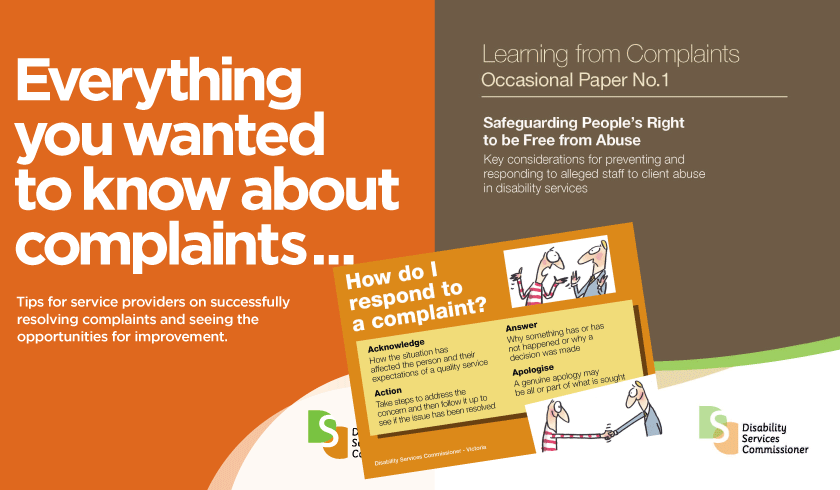The office of the Disability Services Commissioner (DSC) is an independent agency that helps resolve complaints in Victoria.
DSC can help with enquiries and complaints about disability services delivered by registered disability service providers under the Disability Act 2006 that are:
• Funded or contracted by the Department of Families, Fairness and Housing (DFFH)
• Funded by the Transport Accident Commission (TAC).
The Disability Services Commissioner does not handle complaints about the National Disability Insurance Scheme (NDIS) or services funded by the scheme, the National Disability Insurance Agency (NDIA), disability employment services, the Companion Card program or Centrelink.
If you are not sure just contact us.
Skip to section:
I’m a person with disability
My disability makes it hard to communicate.
We can arrange for an interpreter. All of our services are free.
Can you provide me with an advocate?
As a complaints body, DSC does not offer an advocacy service. You can search for an advocacy service on the Disability Advocacy Resource Unit (DARU) website, and contact them with a request.
How will I be included?
DSC has a person-centred approach to complaints resolution. Where appropriate, if someone has made a complaint on your behalf, we will include you and/or your guardian or decision-maker through the complaints process. Our focus is on the person with disability, and we seek to involve you in the process as much as possible.
Back to top
What can I complain about?
The office of the Disability Services Commissioner (DSC) is an independent agency that helps resolve complaints in Victoria.
DSC can help with enquiries and complaints about disability services delivered by registered disability service providers under the Disability Act 2006 that are:
- Funded or contracted by the Department of Families, Fairness and Housing (DFFH)
- Funded by the Transport Accident Commission (TAC).
For more information and examples of complaints that we can handle, see Thinking about making a complaint.
How can you resolve my complaint?
All complaints are assessed by DSC Resolution Officers. Assessment includes looking into the issues raised in the complaint through reviewing documents and speaking to those involved. Your complaint may be resolved during the assessment phase. Many complaints can be resolved through us assisting you and the service to achieve an outcome through the 4 A’s:
- Acknowledgement – how the situation has affected you and your expectations of a quality service
- Answers – why something has or has not happened or why a decision was made
- Actions – taken by the service provider to address the concern and then followed up to see if the issue has been resolved
- Apology – a genuine apology
If the complaint cannot be resolved through assessment, the complaint may be referred to conciliation or investigation. Find out more about the Complaints Process.
My complaint is about abuse or neglect of a person with disability. What will happen if I make the complaint?
All complaints to DSC, including those with allegations of abuse or neglect, will be assessed. Where the Commissioner determines that the complaint is not suitable for conciliation, DSC will consider whether the matter is suitable for investigation. Learn more about investigation.
Where it becomes evident that the complaint involves potential criminal conduct, DSC will refer the relevant aspects of that complaint to Victoria Police. We believe that people with disability have the right to be heard, to be proactively supported, along with their family members, to participate in any investigations relating to allegations of abuse and to access the justice system.
What if you cannot resolve my complaint?
DSC will always work with you and your service provider to try to find an appropriate resolution, however sometimes a complaint may not be able to be resolved. If you’re not happy with the result of your complaint, you can always give us feedback.
Is the complaints process confidential?
Our complaints service is confidential. This means that we comply with Victorian privacy legislation and your details will only be used, with your consent, to facilitate the complaints resolution process.
Can I make an anonymous complaint?
Yes, you can. There are three different ways you can do this. You can:
- let DSC know who you are but tell us not to share your identity with the service provider
- not let DSC know who you are but provide us with contact details so we can reach you if we need more information
- not let DSC know who you are or provide us with your contact details.
One thing to keep in mind when deciding what you want to do is that the more information we have, the more we will be able to do.
Please call us on 1800 677 342 to talk about your concerns.
Can I withdraw my complaint?
You can withdraw a complaint at any time by notifying us. If it appears that you are withdrawing a complaint due to victimisation, coercion or duress from another party, or the health, safety or welfare of the person accessing the service may be affected, s. 112 of the Disability Act 2006 allows DSC to continue dealing with a complaint.
Will it cost me anything to make a complaint?
Our services are free of charge.
Is it safe to make a complaint?
The Disability Act 2006 states that it is an offence to threaten or intimidate a person who wishes to make a complaint to DSC. We will work closely with you and the service provider to ensure that you are not disadvantaged in any way. The service provider is responsible for taking steps to safeguard your right to complain. If you have any concerns about making a complaint, please talk to us.
What if the incident I want to complain about happened a long time ago?
The Disability Act 2006 allows DSC to decline to consider a complaint if it relates to an incident which occurred more than 12 months before the complaint was made. However, we encourage people to submit all complaints about Victorian disability service providers to us for assessment.
I’m a family member or friend of a person with disability. Do I have to be a legal guardian to make a complaint?
Anyone can make a complaint to us about a Victorian disability service provider. Whether you are a person with disability, a family member or friend of someone with disability, a staff member, carer, or a general member of the community – you have the right to make a complaint.
Back to top
I’m a service provider
What training and information resources are available for service providers?
For services providers under the NDIS framework please visit the NDIS Commission website.
DSC has developed a large range of resources to help service providers through the complaints process, and to develop a positive complaints culture. These include a range of information sheets on the complaints process, and guidelines for good practice. Click here to access all DSC resources.
What are our requirements under the Disability Act 2006 in relation to complaints?
All registered and regulated Victorian disability service providers must:
- Institute and operate a system to receive and resolve complaints about services provided
- Provide an annual report to DSC on complaints received including number, type and outcomes of complaints
- Take steps to ensure that there are no adverse effects on a person who has made a complaint to your organisation or to DSC, or a person with disability on whose behalf a complaint was made.
Even when your service has not received any complaints in the year, you will still need to submit an annual report to DSC stating that you received no complaints in that reporting period.
Can you help us meet our legislative requirements in relation to complaints?
DSC offers a secure online complaints register and reporting tool known as the ACR Tool (Annual Complaints Reporting tool). This tool is open throughout the year, so service providers can manage all their complaints in a convenient cost-free way that is consistent with legislation.
For more information about the ACR Tool, please email acr@odsc.vic.gov.au or click here.
Back to top
About DSC
What legislative frameworks does DSC work under?
DSC was established in 2007 under the Disability Act 2006 (the Act). The functions and powers of the Commissioner are detailed in the Act and can be found on this page. We also make specific reference to the following Acts in our annual reports:
- Privacy and Data Protection Act 2014
- Freedom of Information Act 1982
- Charter of Human Rights and Responsibilities Act 2006
- Protected Disclosure Act 2012
What values and principles does DSC work under?
DSC is committed to the values of Rights, Respect and Fairness. We work under the principles of being Accessible, Person Centred, Responsive and Accountable with a commitment to Excellence. We are committed to being a child safe organisation, prioritising the wellbeing of children and adults with disability, including those from a CALD, and Aboriginal or Torres Strait Islander background. Find out more on Our Approach.
I want to give some feedback about DSC.
We welcome all feedback about DSC. You can send us feedback on this page.
Back to top
About DSC Inspection Powers
Can a DSC Authorised Officer inspect paperwork and documents about a person with disability?
Yes but consent must be gained from the person with disability or their guardian before inspecting medical records.
Can people refuse to answer a question?
Yes, if the answer would incriminate or is confidential communication between a person and their lawyer.
A DSC Authorised Officer wants to enter a bedroom where two people with disability live together. Is this OK?
Yes, as long as the DSC Authorised Officer has gained consent from both people.
Can a DSC Authorised Officer question a contractor or a volunteer?
Yes, if they are engaged in providing the service that is relevant to the visit.
Back to top
About DSC Investigations
What penalties apply in DSC accountability investigations?
The Disability Act 2006 outlines a range of offences and associated penalties. These include, but are not limited to:
- It is an offence to hinder or obstruct DSC Authorised Officers from exercising inspection and search powers; 60 penalty units apply to a person and 300 penalty units apply to a body corporate.
- It is an offence to fail to comply with an investigation hearing notice from DSC, without reasonable excuse; 120 penalty units or 12 months imprisonment or both apply to a person, and 600 penalty units apply in the case of a body corporate.
- It is an offence for a person to make an oral or written statement which the person knows is false or misleading in a material respect; penalty not exceeding 60 penalty units.
- It is an offence to threaten, intimidate, persuade or attempt to persuade another person from making a complaint or providing information to DSC relevant to an investigation; 120 penalty units apply to a person and 600 penalty units apply to a body corporate.
- It is an offence to dismiss or refuse to employ a person or subject the person to detriment if the person intends to, or has made a complaint to DSC, or intends to, or provides information or participates in a DSC investigation; 120 penalty units apply to a person and 600 penalty units apply to a body corporate.
- Service providers must comply with a Notice to Take Action issued by DSC; 60 penalty units apply.
- Service providers must comply with subsequent requests from DSC to report on what action the service provider has taken to comply with a Notice to Take Action; 60 penalty units apply.
What protections are in place for persons providing information in DSC accountability investigations?
There are a range of protections under the Disability Act 2006 for persons participating in a DSC investigation. These include, but are not limited to:
- Any person who gives information or evidence, or produces a document to DSC in an investigation, has the same protection and immunity as a witness in the Supreme Court.
- Any disclosure of information made to DSC in good faith for the purpose of an investigation does not constitute unprofessional conduct or a breach of professional ethics and does not make the person liable for the disclosure.
- There are also protections against self-incrimination and protections from providing information if doing so would be a breach of legal professional or client legal privilege.
What happens after a Commissioner-initiated investigation?
Systemic Commissioner-initiated investigations
Following the conclusion of a systemic initiated investigation, DSC will provide written notice of the decision to any disability service involved in the investigation and may also provide written notice of the decision to any person with disability who was the subject of the investigation, their guardian or next of kin. If the notice mentions an individual or service provider in an adverse manner, they will be given the opportunity to comment prior to the notice being provided.
If the investigation has identified that issues of concern exist in the service or services, DSC has the power to issue a Notice to Take Action to disability service providers. DSC can also decide to undertake a follow-up investigation into actions taken by the service provider in response to the Notice to Take Action.
At the completion of a systemic initiated investigation, DSC must prepare a report for the Minister for Disability, Ageing and Carers, and the Secretary to DFFH. If the report makes an adverse comment on or gives an adverse opinion of an individual or service provider, DSC will provide a reasonable opportunity to the individual or service provider to comment on the adverse material, prior to providing the report to the Minister and Secretary.
DSC can also make publicly available a de-identified report on a systemic Commissioner-initiated investigation by tabling the report in the Victorian Parliament.
Individual Commissioner-initiated investigations
Following the conclusion of an individual initiated investigation, DSC will provide written notice of the decision to any disability service involved in the investigation, the person with disability who was the subject of the investigation, their guardian or next of kin and any person who is alleged to have abused or neglected the person with disability.
If the investigation has identified that issues of concern exist in the service or services, DSC has the power to issue a Notice to Take Action to disability service providers. DSC can also decide to undertake a follow-up investigation into actions taken by the service provider in response to the Notice to Take Action.
At the completion of an individual initiated investigation, DSC may prepare a report for the Minister for Disability, Ageing and Carers, or the Secretary. If the report makes an adverse comment on or gives an adverse opinion of an individual or service provider, DSC will provide a reasonable opportunity to the individual or service provider to comment on the adverse material, prior to providing the report to the Minister or Secretary.
Back to top










